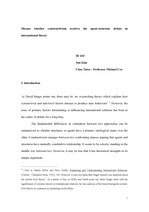

BRONZE
BRONZE 등급의 판매자 자료
Constructivism & agent-structure debate
본 Essay는 제가 런던정경대(London School of Economics & Political Science)의 국제관계학 석사 과정 시 작성했던 Essay이며, 70점을 받았던 Essay 입니다. (일반적으로 70점 이상은 전체 학생의 5~10%에게 부여)
Essay Question 은 Discuss whether constructivism resolves the agent-structure debate in international theory 이며 편의상 Constructivism & agent-structure debate는 제목으로 바꿔서 올립니다.
참고로 제 Essay 및 논문을 표절의 형식으로 사용하시지 않길 요청드리며, idea generation 의 참고자료로 사용하시길 부탁드립니다.
10 페이지
최초등록일 2009.05.21
최종저작일
2005.06

-
미리보기
소개
본 Essay는 제가 런던정경대(London School of Economics & Political Science)의 국제관계학 석사 과정 시 작성했던 Essay이며, 70점을 받았던 Essay 입니다. (일반적으로 70점 이상은 전체 학생의 5~10%에게 부여)
Essay Question 은 Discuss whether constructivism resolves the agent-structure debate in international theory 이며 편의상 Constructivism & agent-structure debate는 제목으로 바꿔서 올립니다.
참고로 제 Essay 및 논문을 표절의 형식으로 사용하시지 않길 요청드리며, idea generation 의 참고자료로 사용하시길 부탁드립니다.목차
I. Introduction
II. Nature of ‘agent-structure’ debate
III. Constructivist answer to the ‘agent-structure’ debate
IV. Fallacies of Constructivism
V. Conclusion본문내용
III. Constructivist answer to the ‘agent-structure’ debate
Constructivism might be seen as an eclectic approach since it argues that the ‘agent-structure problem is solved by giving agents and structures equal and therefore irreducible ontological status’ . However, its rationale and logic can be seen as rather unique since it provides an alternative view on the debate in the light of the importance of ‘normative structure’ and ‘interest formation’.
First, Constructivism highlights not only ‘material structure’ but also ‘normative structure’. Normative structure is said to be ‘systems of shared ideas, beliefs and values’ which ‘exert a powerful influence on social and political action’ . It is significant for material structure since ‘material resources only acquire meaning for human action through the structure of shared knowledge in which they are embedded’ . For instance, despite the importance of military and material structure, the idea of identity in ‘established structures of friendship and enmity’ gives the material balance of power between the United States and Canada radically different meanings from that between the United States and Cuba . This leads us to raise another important question, which is the relationship between normative (ideational) structure and interest formation.참고자료
· Hollis, Martin. and Smith, Steve. Explaining and Understanding International Relations, (Oxford : Clarendon Press, 1991).
· Kegley Jr, Charles W. & Wittkopf, Eugene. R. World Politics : Trend and Formation, (Boston : Macmillan Press Ltd, 1999), 4th edition.
· eus-Smit, Christian. “Constructivism” in Scott Burchill, Richard Devetak, Andrew Linklater, Matthew Paterson, Christian Reus-Smit and Jacqui True eds., Theories of International Relations, (London : Palgrave, 1996), 2nd edition.
· Wendt, Alexander. “Anarchy is What States Make of It : The Social Construction of Power Politics”, International Organization 45, no.2, Spring (1992).
· Wendt, Alexander. “The Agent-Structure Problem in International Relations Theory”, International Organization 41, no. 3, summer (1997).태그
-
자료후기
Ai 리뷰지식판매자가 등록한 자료는 매우 유익하고, 주제가 잘 정리되어 있어 학습에 큰 도움이 됩니다. 특히 자료의 품질이 높고, 내용이 풍부하여 많은 정보를 얻을 수 있었습니다. 앞으로도 이러한 유익한 자료가 계속 등록되기를 기대합니다! -
자주묻는질문의 답변을 확인해 주세요

꼭 알아주세요
-
자료의 정보 및 내용의 진실성에 대하여 해피캠퍼스는 보증하지 않으며, 해당 정보 및 게시물 저작권과 기타 법적 책임은 자료 등록자에게 있습니다.
자료 및 게시물 내용의 불법적 이용, 무단 전재∙배포는 금지되어 있습니다.
저작권침해, 명예훼손 등 분쟁 요소 발견 시 고객센터의 저작권침해 신고센터를 이용해 주시기 바랍니다. -
해피캠퍼스는 구매자와 판매자 모두가 만족하는 서비스가 되도록 노력하고 있으며, 아래의 4가지 자료환불 조건을 꼭 확인해주시기 바랍니다.
파일오류 중복자료 저작권 없음 설명과 실제 내용 불일치 파일의 다운로드가 제대로 되지 않거나 파일형식에 맞는 프로그램으로 정상 작동하지 않는 경우 다른 자료와 70% 이상 내용이 일치하는 경우 (중복임을 확인할 수 있는 근거 필요함) 인터넷의 다른 사이트, 연구기관, 학교, 서적 등의 자료를 도용한 경우 자료의 설명과 실제 자료의 내용이 일치하지 않는 경우
문서 초안을 생성해주는 EasyAI
